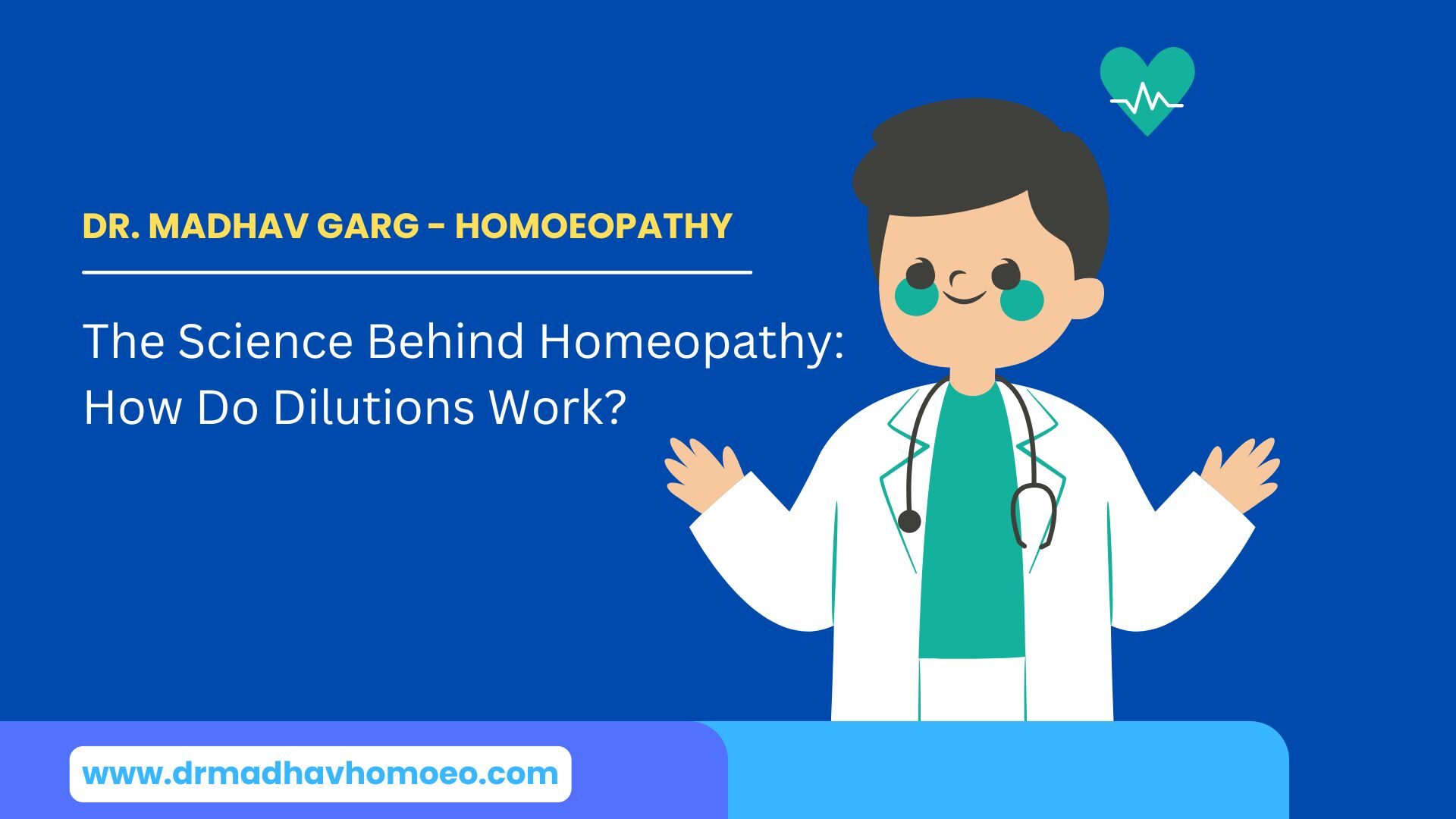The essential aspect of homeopathy involves treating sickness through diluted substances which create similar symptoms in healthy individuals. Samuel Hahnemann established homeopathy during the late 18th century with its foundational belief being that treatment substances resemble the symptoms they aim to remedy. Science supports homeopathy least in terms of its dilution techniques which mainstream medicine disagrees with today.
Looking for safe, natural, and personalized homeopathic treatment? Dr. Madhav Garg, BHMS, is dedicated to holistic healing and patient-centered care at Dr. Madhav Garg’s – Best Homeopathic Clinic in Gurugram. Whether you need expert consultation, customized remedies, or natural solutions for chronic health concerns, Dr. Garg is here to help! Book your appointment today or call ☎ (+91) 084477 93878 to experience the benefits of homeopathy firsthand. Your journey to better health starts here!
How Dilutions Work in Homeopathy:
1. Basic Principle of Dilution: In homeopathy, remedies are prepared through a process called potentization, which involves serial dilution of the original substance. The process involves:
- Dilution: The substance (often derived from plants, minerals, or animal products) is mixed with a solvent, usually water or alcohol. This mixture is then diluted in a specific ratio, such as 1:10 or 1:100. After each dilution, the solution is vigorously shaken or “succussed.”
- Succussion: This shaking or striking of the vial is considered a crucial part of the process. Homeopaths believe that succussion imparts “vital energy” or “information” into the solution, which makes it effective, even though the substance itself may no longer be present in measurable amounts.
2. Potencies: After several rounds of dilution and succussion, the resulting homeopathic remedy is considered to have a specific potency. These potencies are typically denoted by numbers and letters:
- X or D potencies: Representing a 1:10 dilution.
- C potencies: Representing a 1:100 dilution.
For example, a remedy labeled 6C means that the substance has been diluted and succussed six times at a 1:100 ratio. A 30C potency would mean the substance has been diluted 30 times in this same manner.
3. The Dilution Puzzle: One of the most puzzling aspects of homeopathy is that the dilutions are often so extreme that, in many cases, no molecules of the original substance remain in the final solution. For instance:
- A 30C dilution is equivalent to diluting one drop of the original substance in the entire volume of water in the Earth’s oceans, and then taking just one drop from that.
- Beyond a certain dilution, the number of molecules of the original substance becomes statistically insignificant, making it impossible for the substance to have any physiological effect.
4. The “Memory of Water” Hypothesis: Some proponents of homeopathy suggest that water has a “memory” and retains the “information” of the substances that were once dissolved in it, even when they are no longer present. This idea is highly controversial and has not been scientifically proven. Mainstream scientists argue that water’s molecular structure cannot retain such information beyond a certain point, especially considering the extreme dilutions used in homeopathic preparations.
5. Placebo Effect: Many studies have shown that homeopathic remedies can produce positive effects, but these are often attributed to the placebo effect. In placebo-controlled trials, people may experience relief because they believe the treatment will work, even though the remedy has no active ingredients. This psychological response can be powerful, especially in conditions that are influenced by stress or mood, such as chronic pain or depression.
Criticism of Homeopathy:
The scientific community is largely skeptical of homeopathy due to the following reasons:
- Lack of Mechanism: There’s no known scientific mechanism that can explain how homeopathic dilutions work, especially given the extreme dilution levels.
- Poor Evidence: Numerous systematic reviews and clinical trials have concluded that homeopathic treatments do not perform better than placebos.
- Contradiction to Chemistry: The extreme dilutions used in homeopathy are at odds with basic principles of chemistry and pharmacology, where effects typically correlate with the presence of active ingredients.
Conclusion:
Homeopathy remains a controversial and unproven method of treatment. While the process of diluting substances and succussing them is an interesting aspect of homeopathic practice, there is no compelling scientific evidence to support its effectiveness beyond the placebo effect. While some patients report improvements in symptoms, these are more likely due to psychological factors, rather than the efficacy of the remedies themselves.
Ultimately, the scientific consensus does not support homeopathy as an effective treatment, and individuals are encouraged to consult with a medical professional when considering treatment options for health conditions.









